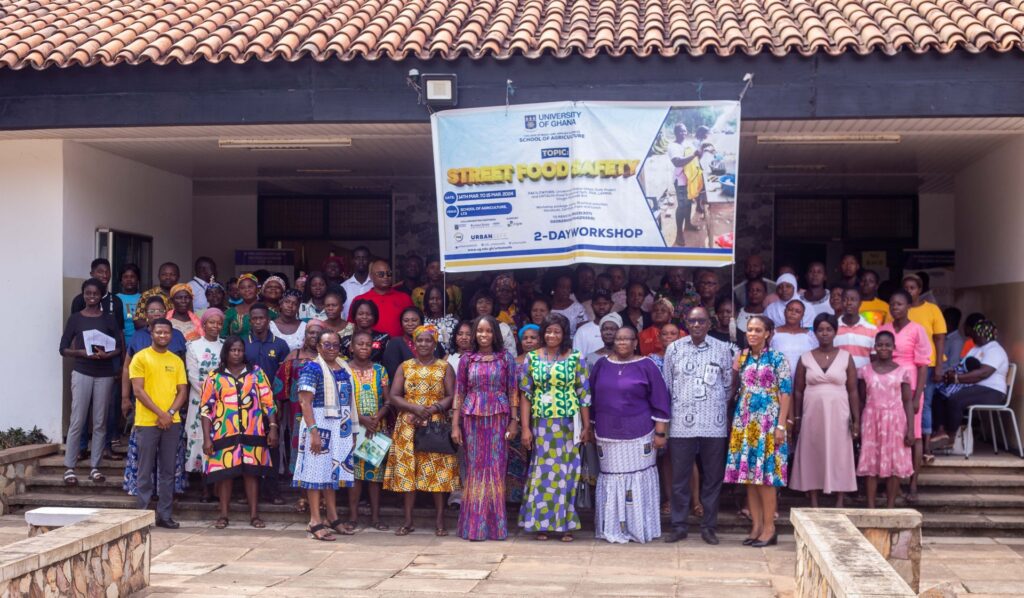Over 100 street food vendors across 29 Metropolitan, Municipal and District Assemblies (MMDAs) in Greater Accra have recently benefitted from a training programme as part of the UrbanSafe Project.
The initiative, organised by the Department of Agricultural Economics and Agribusiness, aimed to enhance food safety skills among street vendors in Ghana.
The two-day training workshop, a culmination of the two-year UrbanSafe Project, commenced with a welcome address from Dr. Cynthia Gadegbeku, Co-PI of the project. She highlighted the importance of the initiative, stating, “The event aims to give feedback and provide two days of training to vendors with information gathered during the survey conducted as part of the UrbanSafe Project.”
Dr. Abigail Adaku, the Principal Investigator of the UrbanSafe Project, provided an overview of the project’s objectives and outcomes. She detailed that the project is focused on addressing challenges faced by food vendors and training them on safety measures for street foods.

Dr. Abigail Adaku, the Principal Investigator of the UrbanSafe Project
Prof. Firibu K. Saalia, current occupant of the OR Tambo Research Chair in Food Science and Technology at the University of Ghana, and Professor at the Departments of Food Process Engineering and Nutrition and Food Science, delivered a brief presentation. He outlined the goals of the OR Tambo Africa Research Chair Initiative (ORTAChI) under which the research was conducted, and its commitment to improving food quality and safety.

Prof. Firibu K. Saalia, OR Tambo Research Chair in Food Science and Technology
In their remarks, Prof. Matilda Steiner-Asiedu, an expert in Nutrition and Food Science at the Department of Nutrition and Food Science and Prof. Irene Egyir, Dean of the School of Agriculture, stressed the paramount importance of maintaining food safety standards, particularly within street food vendors’ operations. They laid emphasis on the potential risks posed by compromised food safety, underlining the widespread implications for numerous consumers and households.

Prof. Matilda Steiner-Asiedu
Dr. Yaw Osei Asare, Head of the Department of Agricultural Economics and Agribusiness, reiterated the importance of food safety and health, while Dr. Elizier Ameyaw-Buronyah, Director of Public Affairs, encouraged the vendors to prioritise food safety and health concerns in their practices.
Dr. Joycelyn Quansah, a Lecturer in the Department of Nutrition and Food Science, also shared insights during the discussions.
The training covered various topics, including food safety management, packaging and personal hygiene. Representatives from regulatory bodies such as the Food and Drugs Authority (FDA), the La Nkwantanang-Madina Municipal Assembly (LaNMMA) Environmental Health Directorate as well as the University of Ghana’s School of Public Health and University Health Services educated vendors on licensing requirements and regulations.
Additionally, a session on street food business management and financing aimed to empower vendors to take charge of their businesses and finances was held.

The workshop, which was organised in collaboration with PASET- RSIF, Kansas University and the Food and Drugs Authority, concluded with interactive sessions allowing vendors to discuss measures to promote food safety and share solutions.
Madam Ruth E. Boateng, a vendor, speaking after the session, expressed gratitude to the University and the research team for the learning opportunity. She, on behalf of the other beneficiaries, pledged to commit to high standards of food safety and also share the knowledge with other vendors in the various communities.

The training provided valuable insights and skills to street food vendors, ensuring safer food practices and healthier communities.

